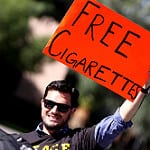Advertising accusations

Photo by Gage Skidmore
Tobacco companies are ‘secretly advertising’ cigarettes on social media platforms such as Instagram, Facebook and Twitter, according to allegations by the Campaign for Tobacco-Free Kids.
The allegations are based on the findings of a two-year investigation by the Campaign and Netnografica, a US-based consumer research and consulting firm specializing in online research.
According to a press note posted on the Campaign’s website, tobacco companies have been paying social media influencers – popular young people with large online followings – to post images of cigarettes and smoking as part of a marketing strategy documented in more than 40 countries.
The findings have been included in a petition sent to the US Federal Trade Commission (FTC) by nine leading public health and medical groups.
‘The investigation documents more than 100 social media campaigns by multinational tobacco giants Philip Morris International, British American Tobacco, Japan Tobacco International and Imperial Brands,’ the Campaign’s note said.
‘Netnografica conducted interviews with young social media influencers who were paid to promote cigarettes online to millions of followers without disclosing that they were engaged in paid advertising (those interviewed were granted anonymity to participate in the research).’
The Campaign note said that the key findings from the investigation included:
- ‘Tobacco companies seek out young people who have significant numbers of followers online and pay them to post photos featuring Marlboro, Lucky Strike and other cigarette brands. Social media influencers are trained on what cigarette brands to promote, when to post pictures for maximum exposure and how to take “natural photos” that do not look like staged advertisements. In Italy, influencers paid to promote Lucky Strike cigarettes were instructed to make sure health warnings on cigarette packs were not visible in photos posted online.
- ‘Tobacco companies organize parties and contests with cigarette brand sponsorships and encourage participants to post on their social media accounts.
- ‘Influencers are instructed to include specific hashtags promoting cigarettes on social media posts. The fact that hashtags used by social media influencers are mostly in English indicates tobacco companies are targeting a global audience that includes American youth.
- ‘Combined, these deceptive social media campaigns for tobacco products have been viewed more than 25 billion times worldwide – including 8.8 billion times in the United States, according to social media analytics commissioned as part of this investigation.’
